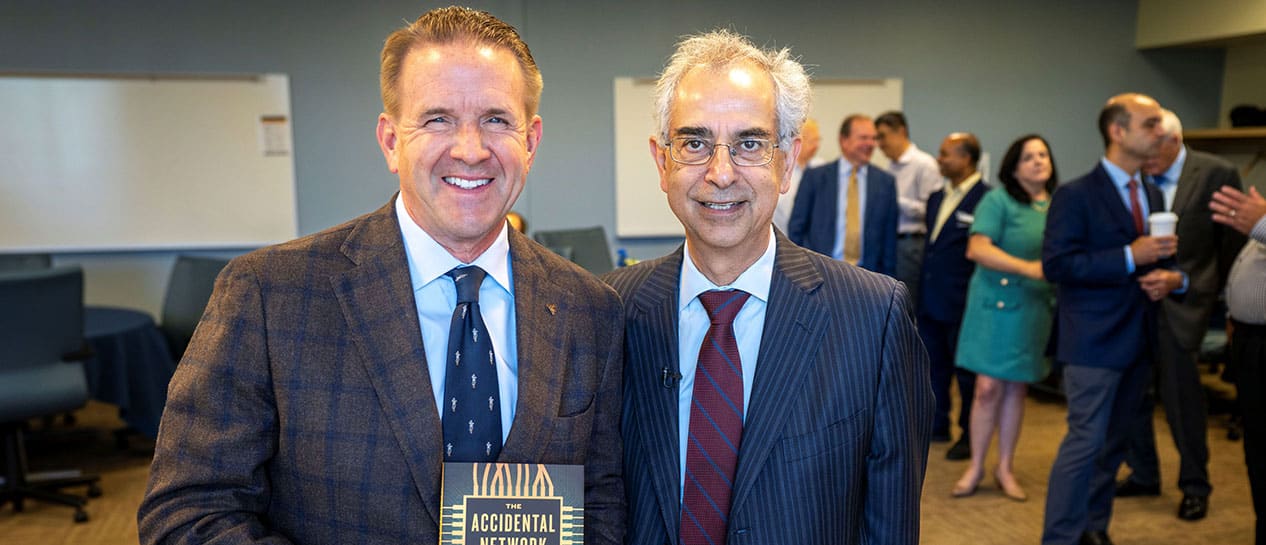I recently traveled to Amsterdam for the International Broadcasting Convention (IBC) held at the RAI Amsterdam center. Alongside Camilla Formica, our Chief Programs Officer, I spent several days immersed in thought-provoking discussions and sessions. The vast show floor (we averaged five miles of walking each day!) and insightful contributions from exceptional leaders across the industry provided a platform to explore the future of media, technology, and leadership.
Some highlights included hearing from Syndeo Institute favorite Evan Shapiro, whose educational content always leaves a lasting impact. And the fireside chat with Pulitzer Prize-winning journalist Mstyslav Chernov, director of the Oscar-winning documentary 20 Days in Mariupol, was a particularly deep, personal perspective on conflict journalism.
Artificial intelligence (AI) is one of IBC’s core pillars. With a robust show program dedicated to the latest developments in AI and the revolutionary impact of AI on media and technology, I fully anticipated sharing highlights about this exciting field. Instead, I want to switch gears and talk about something else that I believe all leaders will find valuable: mental health in the workplace.
Thimon De Jong, founder of Whetston, delivered an impactful keynote focused on “polycrisis” and how it affects leadership and workforce management in today’s world. This was a new concept for me, and it really resonated.
So, what is polycrisis? De Jong explained the term encapsulates the idea of managing multiple simultaneous crises, each compounding the effects of the others. During his presentation, he referenced how the global pandemic was just one piece of the puzzle, intertwined with economic instability, supply chain disruptions, and geopolitical conflicts. These overlapping crises have profound implications for leadership, workplace culture, and how businesses operate.
In this environment, leaders must navigate an unprecedented landscape, making quick yet thoughtful decisions while maintaining the well-being of our teams. The challenge is not just in surviving these crises but thriving in them. This is where emotional intelligence, adaptability, and communication become vital.
One of the most notable shifts since the pandemic has been the rise of mental health as a priority in the workplace. We’re seen it at Syndeo Institute and across our partner organizations. De Jong highlighted how mental well-being has become ingrained in the daily fabric of business operations. It’s a crucial aspect of workforce culture, and something I do not want to ignore.
As leaders, it is essential to address mental health not as an afterthought but as part of a proactive, preventative effort. While this is easier said than done, it requires commitment, empathy, and the right questions. Leaders need to consistently check in with their teams and ask, “What are you doing for your mental health? and “What do you need to continue supporting your mental health?” These questions lead to deeper insights into how employees manage their well-being, giving leaders an opportunity to offer meaningful support.
Another key takeaway from De Jong’s presentation was his analysis of how different generations view crises. Individuals over 45 tend to be more worried and wearier, seeing a polycrisis as a significant obstacle. Meanwhile, those aged 35-45 perceive it as a manageable bump in the road. What’s particularly fascinating is how the youngest generation in the workforce, those under 35, have grown up with crises as a constant in their lives. They often adopt a more fatalistic approach, seeing crises as part of the norm, and are credited with bringing mental well-being into workplace conversations.
This generational divide underscores the importance of tailoring HR strategies to different age groups. De Jong’s advice to leaders is to engage younger employees as mentors in a “reverse mentorship” model. A fresh perspective helps seasoned leaders stay in tune and understand the values and priorities of the younger workforce, particularly mental health.
One of the common traits among individuals who thrive during a polycrisis is high emotional intelligence (EQ). De Jong emphasized that while EQ is often seen as an innate trait, it can be learned and developed. Emotionally intelligent leaders are able to adapt to change, find opportunities in unexpected situations, and make thoughtful, calculated risks—all essential qualities in navigating a world of constant crises.
De Jong’s analysis aligns closely with the principles we teach at Syndeo Institute’s Intrapreneurship Academy (IA).
- Strategic Adaptability: In an environment of constant change, individuals who can reframe crises as opportunities will succeed. IA emphasizes adaptability as a core competency, training leaders to respond strategically rather than react impulsively.
- Opportunity-Based Mindset: Intrapreneurship focuses on more than just doing your job well; it encourages finding ways to improve and innovate from within. This proactive, opportunity-based approach boosts employee productivity, creativity, and engagement, leading to better business outcomes.
- Emotional Intelligence Development: At IA, participants are equipped with the tools to enhance their emotional intelligence, helping them navigate the complexities of modern work environments and lead teams effectively through crises.
The future of leadership is one where understanding and engaging with generational differences, fostering emotional intelligence, and prioritizing mental health are non-negotiable. We are excited to continue exploring the concept of polycrisis through our IA programs, to ensure our industry’s workforce is future-proof.



